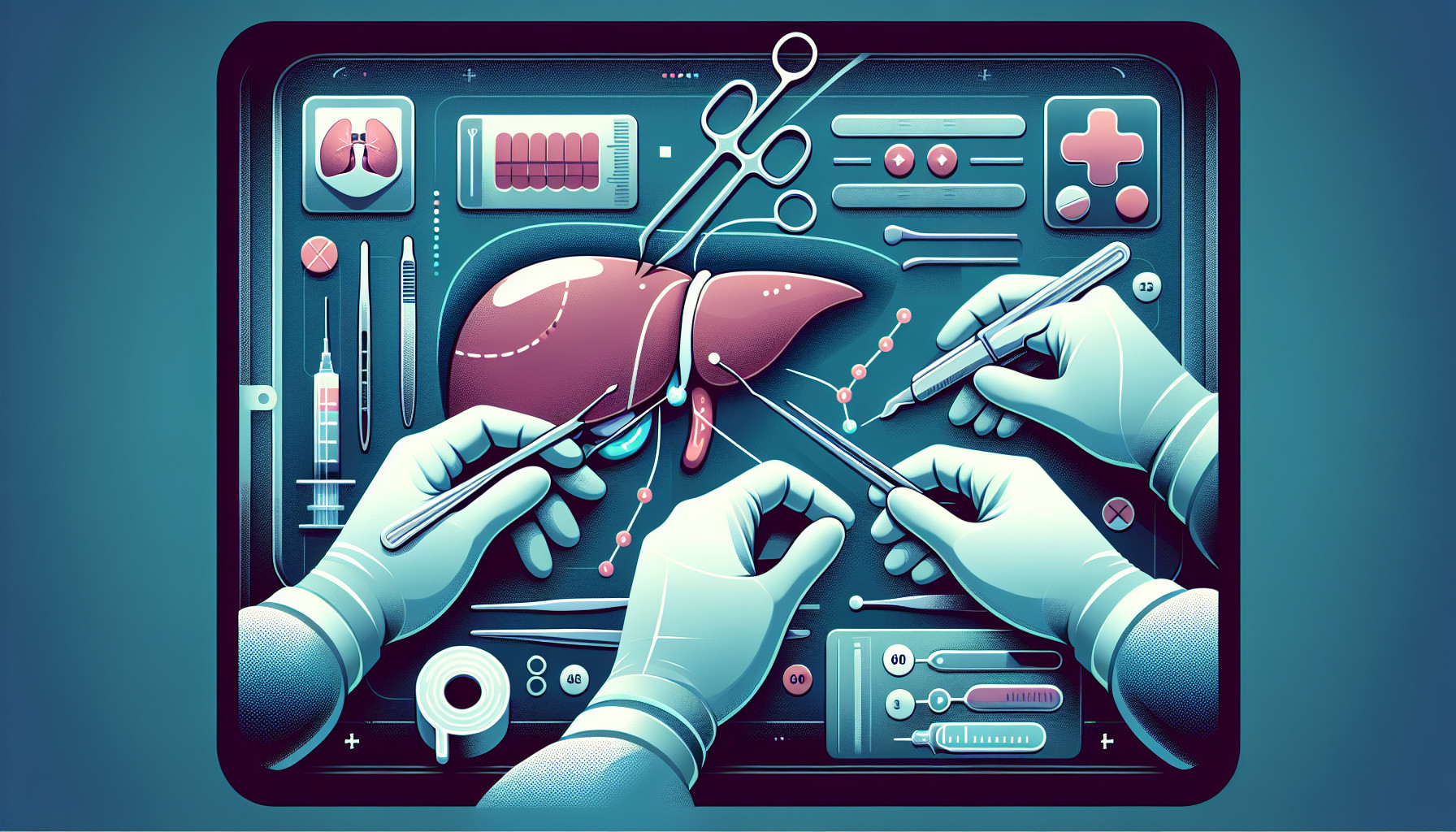Our Summary
This research paper looks into the prevalence of a liver disease called Nonalcoholic steatohepatitis (NASH) in obese patients undergoing weight loss surgery and the effectiveness of liver biopsies in diagnosing the disease.
Liver biopsies are a procedure where a small sample of the liver is taken to examine for diseases. During the study, some patients going through weight loss surgery were given liver biopsies routinely, while others were selected for the procedure based on certain factors. The study found that when liver biopsies were performed as a routine part of the weight loss surgery, the detection rates for liver disease were much higher compared to when they were done selectively.
The study also found that the procedure did not increase the risk of complications after surgery. Patients with a very high Body Mass Index (BMI) and those with insulin-dependent diabetes were more likely to have NASH, while Black patients were less likely to have the disease.
In simple terms, the study suggests that making liver biopsies a routine part of weight loss surgery can help identify more cases of liver disease in obese patients without increasing the risk of complications from the surgery.
FAQs
- What is the significance of performing liver biopsies during weight loss surgery?
- Does performing a liver biopsy increase the risk of complications after weight loss surgery?
- Are there certain groups of people who are more likely to have Nonalcoholic steatohepatitis (NASH)?
Doctor’s Tip
Therefore, a helpful tip a doctor might tell a patient about liver biopsy is that it can be a valuable tool in diagnosing liver diseases, especially in obese patients undergoing weight loss surgery. It is important to follow your doctor’s recommendations and discuss any concerns or questions you may have about the procedure. Additionally, maintaining a healthy lifestyle and managing any underlying health conditions can help reduce the risk of developing liver disease.
Suitable For
Patients who are typically recommended for liver biopsy include:
Patients with suspected liver disease: Liver biopsies are often recommended for patients who have abnormal liver function tests, unexplained jaundice, or other symptoms of liver disease.
Patients with chronic liver conditions: Patients with chronic liver conditions such as hepatitis B or C, autoimmune liver disease, or cirrhosis may be recommended for liver biopsy to assess the extent of liver damage and plan treatment accordingly.
Patients with suspected liver tumors: Liver biopsies may be recommended for patients with suspected liver tumors to determine if the tumor is cancerous or benign, and to guide treatment options.
Patients with abnormal imaging results: Patients with abnormal results on imaging tests such as ultrasound, CT scan, or MRI may be recommended for liver biopsy to further evaluate the liver tissue.
Patients undergoing weight loss surgery: As seen in the research paper mentioned above, obese patients undergoing weight loss surgery may be recommended for liver biopsy to assess for conditions such as NASH, which can impact their overall health and treatment plan.
Overall, the decision to recommend a liver biopsy is based on the individual patient’s medical history, symptoms, and diagnostic test results, and should be made by a healthcare provider in consultation with the patient.
Timeline
Before Liver Biopsy:
- Patient undergoes weight loss surgery due to obesity.
- Some patients are selected for liver biopsies based on certain factors, while others receive the procedure routinely.
- Patients with very high BMI and insulin-dependent diabetes are more likely to have NASH.
- Black patients are less likely to have NASH.
After Liver Biopsy:
- Liver biopsy is performed to take a small sample of the liver for examination.
- Detection rates for liver disease are higher when liver biopsies are done routinely.
- Liver biopsies do not increase the risk of complications after surgery.
- Routine liver biopsies can help identify more cases of liver disease in obese patients undergoing weight loss surgery.
What to Ask Your Doctor
When discussing liver biopsy with your doctor, some questions you may want to consider asking include:
- What is the purpose of the liver biopsy in my specific case?
- What information will the liver biopsy provide about my liver health?
- How will the liver biopsy be performed and what can I expect during the procedure?
- Are there any risks or complications associated with having a liver biopsy?
- How long will it take to get the results of the liver biopsy?
- What are the potential treatment options if the liver biopsy shows any abnormalities?
- Will the liver biopsy affect my recovery after weight loss surgery?
- Are there any specific factors or conditions that may increase my risk of having liver disease, such as NASH?
- How frequently should I have follow-up liver screenings or biopsies after weight loss surgery?
- Are there any lifestyle changes or precautions I should take to support my liver health after the liver biopsy?
Reference
Authors: Tseng J, Korman J, Noureddin M, Shouhed D, Miller JP, Feng X, Burch M. Journal: Obes Surg. 2022 Feb;32(2):463-471. doi: 10.1007/s11695-021-05797-w. Epub 2021 Nov 23. PMID: 34816355
